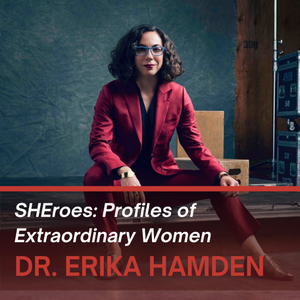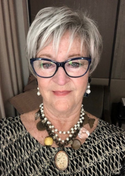
By Susan Hitchcock
Founder & Host Emerita of Women in Leadership
Meeting and being inspired by a highly respected astrophysicist while on a Caribbean cruise vacation was quite unexpected. Nevertheless, that’s exactly how this SHEro profile came to be. Dr. Erika Hamden was a special speaker onboard the Celebrity Millennium at the end of December 2021. Dr. Hamden (Erika) is an assistant professor of astrophysics and astronomy at the University of Arizona and Steward Observatory. She’s also a NASA project collaborator as well as a 2019 recipient of a prestigious Presidential Early Career Award for Scientists and Engineers (PECASE).
As a speaker, Erika’s passion was clear and she was entirely in her element discussing topics like black holes, next generation telescopes, and the past and future of space travel. (Note: Who knew one could learn so much about space while cruising in the ocean!) Not surprisingly, Erika left the audience mesmerized by the wonders of the universe and all things related to space. And, for at least one person, there was the desire to learn more about Erika herself. What follows is her story – filled with amazing accomplishments and the potential for more ‘stellar’ achievements yet to come.
How it all began
Growing up in Montclair, NJ, Erika was one of five girls born to a high school biology teacher (mother) and a physics professor (father). Being smart ran in her family and both nature and nurture played a part in her early development. But Erika further explained, “My parents never really pushed me in any direction. As a kid, I was just interested in space. When I was 7, I entered a contest to rename the “Big Bang Theory” and I watched a PBS show narrated by Tom Selleck about the universe. That was it, I was hooked!”
In high school, Erika continued to excel academically but she also played sports and enjoyed the normal teen activities. Even so, she was unique among her friends because she wanted to explore space and become an astronaut – and she set about to prepare herself for that exact career path.
Means to an end: a non-linear path
With her sights set on being a NASA astronaut, Erika thought she should go to college where many astronauts went, namely the Massachusetts Institute for Technology (MIT.) She applied, was accepted and started her journey, only to discover that MIT wasn’t a good fit for her. “That was a rather difficult time,” Erika said, “but I knew I wasn’t really dropping out. I just needed to try another path.”
Harvard turned out to be her next choice and the right path. She enjoyed the more nurturing environment there along with the high academic standards. Ultimately that led her to her bachelor’s degree in Astrophysics and Astronomy. After graduating and working for a while at the Harvard Center for Astrophysics, Erika’s path took a sharp turn towards another of her passions. It was an opportunity to build her identity in a completely different field – the world of culinary arts.
The next step on her path was a move to London where she studied and ultimately earned a certificate at the famous Le Cordon Bleu. Returning to New Jersey, she put her new skills to work as a chef. “I’m definitely a foodie and I love to create new dishes,” Erika said. “Cooking was and still is one of my favorite things in life.” (Note: Who knew that in 2020 a pandemic would come along and provide a whole new dimension to cooking at home!)
In time, Erika’s interest in science, space and “the possibility of things unknown” could not be denied and she was drawn back into the world of higher education. She enrolled at Columbia University in New York in 2007 and continued there until she received her PhD in 2014. During her time at Columbia, Erika held a NASA Earth and Science fellowship, just one of a number of honors and awards she received from NASA and the National Science Foundation (NSF).
Next on her path was an extraordinary opportunity to do postdoctoral research at the California Institute of Technology (CalTech). It was there she developed an ultraviolet telescope for a high-altitude balloon – the Faint Intergalactic–medium Redshifted Emission Balloon, or FIREBall-2. “The launch of this telescope balloon will always be one of my proudest accomplishments,” Erika said. “I was in charge of the team and worked with my professor and mentor, Christopher Martin. Even though the project outcome wasn’t a scientific success, it was an incredible learning experience.”
To be sure, even at this early stage of her career, Erika was being recognized for her intellect, accomplishments and potential. In 2014 she was a NSF Astronomy and Astrophysics postdoctoral fellow and in 2016 she was the first woman to be awarded a NASA Nancy Roman technology fellowship for her work in UV detectors. The next year she was also named a Robert Andrews Millikan fellow.
More milestones and accolades
In 2018 Erika joined the faculty at the University of Arizona and Steward Observatory in Tucson where she is currently teaching, conducting research and working on various space-related projects. In addition to her work in academia, she was one of 20 people selected as a TED fellow in 2019. Her TED Talk was widely acclaimed and covered by Wired Magazine. She can also be found on podcasts and various speaking engagements – sometimes on a cruise ship!
If you ask Erika about what she’s most proud of, in addition to the FIREBall-2 project, she’ll tell you about her latest NASA proposal. It’s her own idea and it’s called the “Hyperion Telescope.” She and her team of scientists at the U of AZ submitted their proposal and are awaiting the first response, hopefully by summer 2022.
Erika’s also extremely proud of one of her postdoc scholars, Carlos Vargas, who developed a telescope project called Aspera and submitted a proposal to NASA. She is the deputy principle investigator (DPI) for the project which in January 2021 was awarded $20M over 5 years. “Carlos is now a fellow faculty member. It’s a wonderful feeling to be able to work with and help others as they pursue their own dreams and advance in their careers. And sometimes,” Erika said with a smile, “the student may even outperform the teacher!”
When Erika won the PECASE in 2019, she knew it was a very big deal, particularly because the nomination came from NASA. It’s the highest award given across multiple agencies in the federal government. “Of course I was proud to have my parents there at the award ceremony in Washington, D.C. – and as a female scientist – I wanted to be sure I stood out. So in the middle of all the conservative attire around me, I had on a super red dress!”
What’s new and what’s next
Clearly Erika is a role model for girls and women who are or could be interested in STEM fields. She serves as an ambassador with the “IF/THEN” Initiative, a nationwide effort launched by Lyda Hill Philanthropies. The goal of this program is to advance women innovators in STEM fields, inspire the next generation of girls, and increase gender representation. That includes raising awareness within the media and upping the visibility of women. Erika’s also done some TikTok videos for a CBS program called “Mission Unstoppable” which is intended to inspire young girls to consider STEM careers.
In her personal space and time, Erika’s world includes a lot of yoga. “I’m actually working on my ‘freestanding’ hand stand but I’m not quite there yet,” she added. When she’s not doing that, she may be hiking or learning to fly! Yes, Erika’s on her way to getting a private pilot’s license! And why not? She’s always looking up to the sky and beyond.
Of course, there’s one other thing that continues to get Erika excited, i.e., her lifelong dream of adding “astronaut” to her resume. While she’s applied three times but not yet been accepted, she’s not discouraged. She even framed her first rejection letter to remind her to keep trying.
“I understand there are only a few openings,” she said, “but it only takes one time when my background and expertise are exactly what they need for the next mission.”
From an external perspective, it doesn’t hurt that NASA knows about Erika based on all the awards she’s received over her career so far. When the time is right for this dedicated scientist, she’ll likely go far, far away, maybe to the space station or beyond. (Note: NASA’s latest moon project – Artemis – features a significant number of females in key roles – all critical to the project’s success.)
At the end of the day, one thing’s for sure. Erika will always be a SHEro and a galactic explorer – one telescope after another.
Interview & Profile by: Susan Hitchcock, Founder of The Age of SHEroes SusanHitchcock@turknett.com Susan Hitchcock’s Bio 770-270-1723
